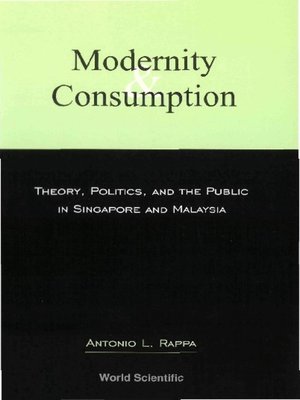Modernity and Consumption
ebook ∣ Theory, Politics, And The Public In Singapore And Malaysia
By Antonio Leopold Rappa

Sign up to save your library
With an OverDrive account, you can save your favorite libraries for at-a-glance information about availability. Find out more about OverDrive accounts.
Find this title in Libby, the library reading app by OverDrive.



Search for a digital library with this title
Title found at these libraries:
| Library Name | Distance |
|---|---|
| Loading... |
The Enlightenment theorists involved in the public/private debate exposed the logical fallacies of theology and the philosophical weaknesses of metaphysics but left little room for understanding contemporary modes of consumption. What does it mean to be a consumer in the early 21st century? Do modern markets provide real choices for consumers in neoliberal capitalist democracies? Or are consumers ironically slaves to their own patterns of consumption? Rejecting Habermas' conceptualizations in The Structural Transformation of the Public Sphere (1991), Rappa offers an examination of modernity and consumption with a non-Marxist, modernity-Resistance-theoretical frame (mRf). He argues that late modernity — the ethos, experience, and consciousness of global and technological transformation today — is not about the fusion of “public and private” spaces. Rather, modernity and consumption involves the deep penetration of private space by public space to the extent that private space becomes dependent, conditional, and decrepit. The “Private” has become contingent on the “Public”. Decisions about what to consume no longer reflect the mindful choices of private, interest-seeking, and wealth-maximizing individuals but reveal a new kind of public control through foundational images of success, failure, horror, violence, and hope.







